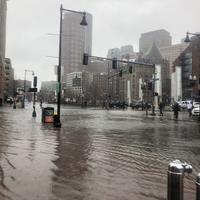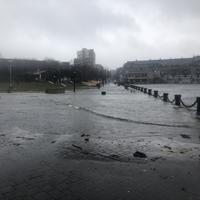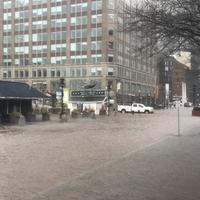Flooding in Boston
Boston's flood risk is on the rise. Here are ways you can be prepared.
Boston's sea levels are projected to rise by three feet or more by the end of the century. This will make floods from today's harshest storms more likely to occur. If your property is in a floodplain, or you're thinking about building within one, we have information for you. This page gives you multiple resources to help better protect your property.
Please Note:The information on this page is to help prepare for future floods. If a flooding event is in the forecast, please review the Office of Emergency Management's flooding tips to get yourself prepared.
Ways you can prepare
Get prepared
Understand your flood risk
If your property is located in a floodplain, it's at risk of flooding. Floodplains are areas of land at risk of flooding during the 1 percent annual chance flood (100-year flood). The 1 percent annual chance flood is a flood event that has a 1 percent chance of taking place any year.
Do you know if your property is within the floodplain? Enter your address through the link below to understand your risk to flooding:

Get a flood insurance estimate
Find an insurance agent near you. Do you already work with an agent for homeowners or renters insurance? They also may be able to help you with buying flood insurance.
You can only buy flood insurance through an insurance agent. You cannot buy it directly from the National Flood Insurance Program, or the City of Boston. Does your insurance agent not sell flood insurance? Contact the National Flood Insurance Program’s Help Center at 1-800-427-4661. You can request an agent referral.

Lower your risk and rate
There are many ways to reduce your flood risk. This can can reduce your flood insurance costs.
- Wet flood proofing prepares existing buildings to allow floodwaters to pass through them. Examples include floodvents and raised utilities.
- Dry flood proofing makes existing buildings watertight so floods can't get through. This can be done through wall reinforcements and sealants.
- New or substantial construction must meet minimum requirements that help prevent or reduce damage from floods.
Common questions
Common questionsFlood hazard maps, also called Flood Insurance Rate Maps, show levels of flood risk. They are used to find the flood risk to your community, home, or business.
The Federal Emergency Management Agency (FEMA) has been revising its flood maps. The goal is to reflect current flood risks in coastal areas nationwide over the last few years. The current maps became effective on March 16, 2016.
When you review FEMA's flood map, you'll see some common symbols:
- Moderate to low-risk areas are represented on the maps by the letter X.
- High-risk areas are labeled with such designations as A, AE, AO, or AH.
- High-risk areas that have more risk from storm surge and wave action are labeled V or VE.
You may still experience heavy rains or other sorts of flooding. But, you are less likely to experience coastal flooding. Even if your property is outside of high-risk areas, you may still want to buy flood insurance.
Flooding can still happen often in areas designated at moderate or minimal risk. In fact, 25 percent of all flood insurance claims take place in these areas.
The Boston Planning and Development Agency created a flood risk tool. This tool shows the flood risk of a 1 percent chance flood with 40 inches of sea level rise. It also offers guidance on the elevation your property should be designed to.
If the flood maps show your property is at a higher risk (Zone A or V), you will need to buy flood insurance. It is required by law if you carry a mortgage from a federally regulated or insured lender.
If you do not have a mortgage, we still strongly recommend flood insurance. Most homeowners insurance does not cover flood damage.
If your property is in a moderate-to-low-risk area (Zone X), you are not required to buy flood insurance. Please keep in mind, though, that your risk has been reduced, not removed. You may still want to consider buying flood insurance.
Is your property in a flood hazard area? Contact your insurance agent and see if you already have flood insurance. Are you looking to get flood insurance? Check online to find a local flood insurance agent.
If you have more questions, make sure to check out our guide on understanding flood insurance:
Pay attention to emergency alerts provided by the City's Office of Emergency Management. For up to date information, you can also sign up for emergency alerts.
If a forecasted storm causes flooding in Boston, the City has developed flood tips to help you prepare and recover.
If you are dealing with an emergency, dial 9-1-1. For non-emergency issues, dial 3-1-1.
High Water Marks
On January 4th, 2018 a bomb cyclone (also known as Winter Storm Grayson) caused historic-level flooding across Boston. This was the highest the water in Boston Harbor has ever gotten. To memorialize this storm, we are installing signs at four locations in Boston to show how deep flood waters were. They also show how much flooding we could see from a similar storm in the future with sea-level rise.
Sign LocationsThe first sign was unveiled by the Mayor during the ribbon cutting for the newly renovated McConnell Park in Dorchester. McConnell Park experienced significant flooding in the fields and parking lot in 2018. Flood waters made their way across the park and into low lying areas in neighboring backyards, flooding basements and properties. McConnell Park was intentionally redesigned with climate preparedness at its core and includes resilient measures to sustain the community in the face of climate change.
To learn more and see all the locations where the signs will be posted, visit our StoryMap!



